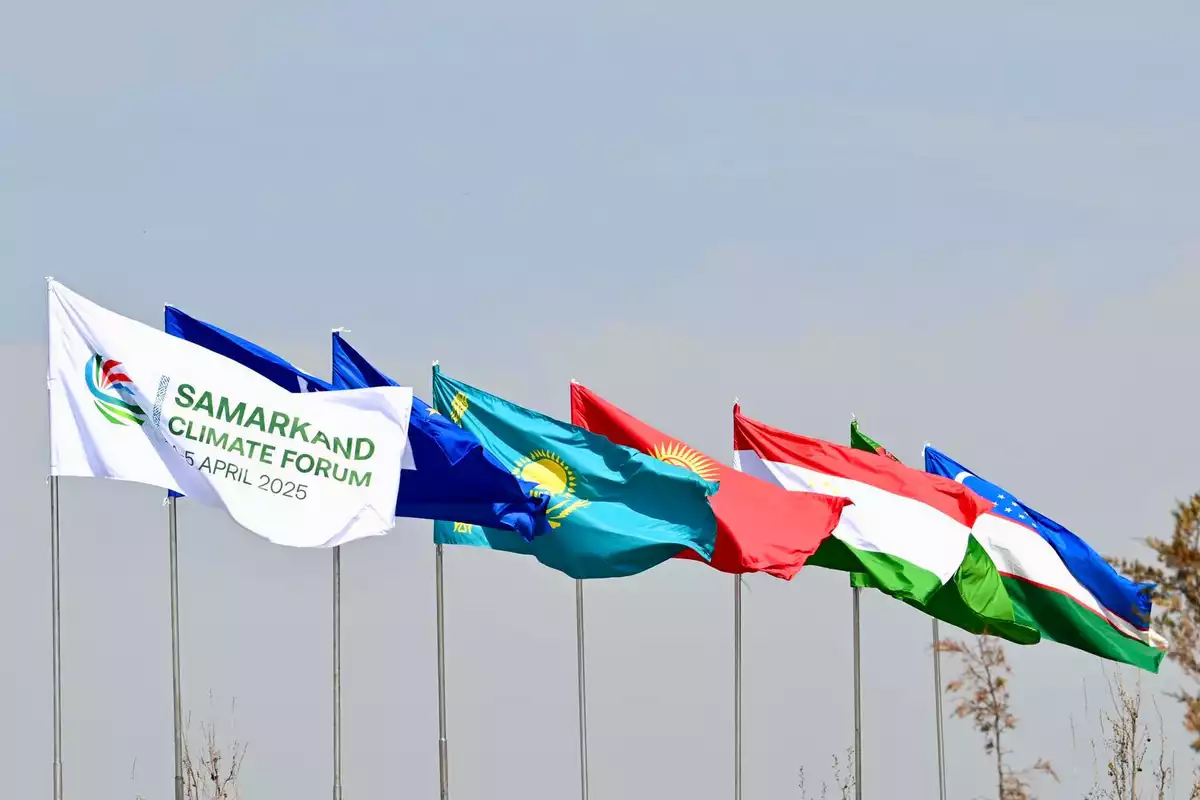
Photo credit: euractiv.com
Focusing on access to rare metals and critical minerals, several top EU leaders are heading to Samarkand to meet with Central Asian presidents in a magnificent palace on the outskirts of this historic crossroads city.
Central Asian leaders invited the European Union with a mix of enthusiasm and caution to gather on Thursday and Friday in Samarkand, situated along the historic Silk Road trade routes which now serves as Uzbekistan's host city for major diplomatic meetings, The Caspian Post reports citing Euractiv.
The aim is to “significantly strengthen ties”, said the EU's ambassador to Uzbekistan, Toivo Klaar.
Among the few announcements expected at the summit itself is the the creation of a European Investment Bank office in Tashkent, and plans for a European investment forum to be held in Uzbekistan before the end of the year.
A “Samarkand declaration” that will reflect “the common aspiration of the parties to establish a strategic partnership” is also expected at the summit. Talks will touch on issues including connectivity, the environment and security as this year's EU focus considerably shifts to critical minerals.
In this part of Eurasia, which has long been seen as a backwater by many in the EU, has seen a renewed interest from the West since the start of Russia's full-scale invasion of Ukraine in 2022, which upended long-standing economic relations and led Europeans to reconsider their geopolitical position.
The landlocked former Soviet republics in Central Asia - Kazakhstan, Kyrgyzstan, Tajikistan, Turkmenistan and Uzbekistan - are strategically significant, with governments still close with Moscow and much courted by Beijing. Russian firms have used the region as a base for efforts to circumvent Western economic sanctions.
Europeans are seeking to strengthen their influence with Central Asian governments for this reason. But efforts to secure supplies of important minerals, and Europe's urgent need to diversify energy supplies, are also key motivations.
Rare-earth diggers
In addition to large uranium reserves, Central Asian countries have vast deposits of rare earths and new minerals such as lithium, as well as a host of other resources that are essential for the energy transition and new technologies.
This is what Brussels is actively seeking, as the EU currently depends almost entirely on China for supplies of those resources.
In March, the European Commission unveiled a plan to revive mining, including projects in third countries, less than a year after EU legislation aimed at securing the supply of critical raw materials came into force.
"We see the EU is very interested in Central Asia," said Han Ilhan, a consultant and board advisor to the Uzbekistan Technological Metals Complex. "Many projects are being discussed right now.”
Central Asia could become something like the El Dorado of European dreams. The 34 critical raw materials identified as needed by the EU - including cobalt, copper, tungsten, lithium and nickel - are present in large quantities in the Central Asian subsoil.
“It's a little-known region, yet all the Central Asian countries are among the top 10 richest in terms of ores and rare earths, varying by type of material, with Kazakhstan and Uzbekistan ahead of the pack,” said Roman Vakulchuk, a researcher at the Norwegian Institute of International Affairs.
“The investment climate is not very favourable, so we are not yet seeing a rush of Western rare metals western mining companies into Central Asia. But it won't be long,” said a French diplomat in Kazakhstan. The diplomat pointed in part to the absence of international standards in the mining sector in Central Asian countries.
That hasn't stopped some European firms from plunging into the region. Germany's HMS Bergbau AG is implementing a joint project to exploit lithium deposits in eastern Kazakhstan.
In November, Astana and Paris signed a roadmap for a strategic partnership in the field of critical resources and materials that runs through 2026. The deal should enable French companies to penetrate the Kazakh geological market as early as this year.
At the EU level, Commissioner for External Partnerships Joseph Síkela signed a €3 million partnership agreement with Kazakhstan on critical raw materials and rare earths on March 13.
Last May, Uzbekistan signed a memorandum of understanding with the EU for the same sector.
Late to the game?
The EU may have arrived late to Central Asia.
China has been interested in its neighbours' underground resources for over a decade, and Chinese fims already hold most of the licenses and mining sites in Kyrgyzstan and Tajikistan. The majority of critical mineral exports from Kazakhstan and Uzbekistan are currently reserved for Beijing.
Russia, for its part, has for decades largely secured its uranium needs from the region, which the Kremlin regards as its strategic "near abroad". The region is also economically dependent on Moscow for many infrastructure projects.
On the other hand, the rush for critical metals in Central Asia has not gone unnoticed by other newcomers such as the United States, Canada and South Korea, all of which have recently signed major deals with Kazakhstan and Uzbekistan.
"Despite its fine words, the European Union is only involved in two or three projects in Central Asia. That's very little and very slow, even though it has been interacting with these governments for decades," Vakulchuk said, pointing out that rare metals are not mentioned in the EU's 'Global Gateway' strategy until 2023.
But the region is still heavily dependent on Russia and China, which remains a sensitive issue.
“We see from Central Asia a wish to deepen relationships with the EU and diversify their foreign policy,” one top EU official said.
As the Samarkand summit approaches, European interest seems to have been appreciated - but has been greeted with caution, with no statement from Central Asian republics suggesting that the EU will play a greater role in the region.
Share on social media